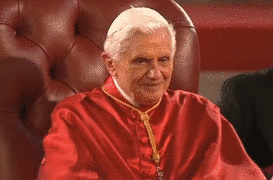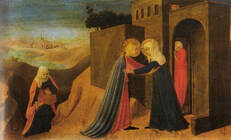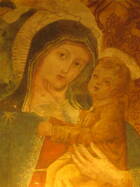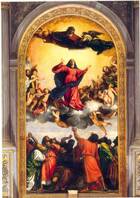
Papa Benedict XVI's Catechesis on Our Lady
given at his Wednesday Audiences
The Magnificat 
BXVI: "The first movement of the Marian canticle (cf Lk 1, 46-50) is a sort of solo voice that rises to heaven to reach the Lord. We hear the voice of Our Lady herself who speaks thus of her Saviour, who has done great things in her soul and in her body. In fact, note the constant resonance of the first person: "My soul... my spirit... my Saviour... they will call me blessed... great things have been done in me... ". The soul of the prayer is, thus, the celebration of divine grace which has made an irruption in the heart and in the existence of Mary, rendering her the Mother of the Lord.
The intimate structure of her praying song is, therefore, praise, thanksgiving, grateful joy. But this personal witness is not solitary and intimate, purely individualistic, because the Virgin Mother is conscious of having a mission to accomplish for humanity and her story is inserted within the history of salvation. And thus she can say: "His mercy extends from generation to generation over those who fear him" (v 50). With this praise of the Lord, Our Lady gives voice to all the redeemed creatures who in her "fiat", and thus in the figure of Jesus born of the Virgin, find the mercy of God. .."
The Divine Motherhood of Mary 
BXVI: "The qualification of Mother of God, so profoundly linked to the feasts of Christmas, is therefore the fundamental title with which the community of believers honours, we could say since always, the Holy Virgin. It expresses well the mission of Mary in the history of salvation. All the other titles attributed to Our Lady find their foundation in her vocation to be the Mother of the Redeemer, the human creature elected by God to realise the plan of salvation, centered on the great mystery of the incarnation of the divine Verb. In these festive days we have stopped to contemplate in the crib the representation of the Nativity. At the centre of this scene we find the Virgin Mother who offers the Baby Jesus to the contemplation of all those who come to adore the Saviour: the shepherds, the poor people of Bethlehem, the Magi come from the East. Later, on the Feast of the Presentation of the Lord, which we celebrate on 2nd February, it will be the elderly Simeon and the prophetess Anna who will receive the little Child from the hands of his Mother and adore him. The devotion of the Christian people has always considered the birth of Jesus and the divine motherhood of Mary as two aspects of the same mystery of the incarnation of the divine Verb and so has never considered the Nativity as a thing of the past. We are "contemporaries" of the shepherds, of the Magi, of Simeon and Anna, and as we go with them we are full of joy, because God wanted to be the God with us and He has a mother, who is our mother."
The Assumption of the Blessed Virgin Mary 
L’Assunzione della Beata Vergine Maria 
BXVI: "Since the first centuries of Christianity, this feast has always been deeply felt by the Christian people; as is well known, it celebrates the glorification, also bodily, of that creature whom God chose as Mother and whom Jesus on the Cross gave as Mother to all humanity. The Assumption evokes a mystery that interests each one of us because, as the Second Vatican Council affirms, Mary "shines here below as sign of sure hope and consolation for the people of God who are on the pathway" (Lumen Gentium, 68). However, we are so caught up in the events of each day as to sometimes forget this consoling spiritual reality, which constitutes an important truth of faith.
How then can we make this luminous sign of hope be perceived more and more by all of us and by today's society? There are those today who live as if they would never have to die or as is everything must end with death; others, holding that man is the unique architect of his own destiny, behave as if God did not exist, sometimes even going so far as to deny that there is room for Him in our world. The great successes of technology and science, which have considerably improved humanity's condition, leave unsolved however the deepest questions of the human soul. Only openness to the mystery of God, who is Love, can quench the thirst for truth and happiness in our hearts; only the prospect of eternity can give authentic value to historical events and above all to the mystery of human fragility, of suffering and of death."
Mary, Queen 
Beata Vergine Maria Regina 
BXVI: "This is the root of today’s feast: Mary is Queen because she is associated in a unique way to her Son, both on the earthly pathway and in the glory of Heaven. The great saint of Syria, Ephrem the Syrian, affirms, concerning the royalty of Mary, that it derives from her motherhood: she is Mother of the Lord, of the King of kings (cf Is 9, 1-6) and shows us Jesus as our life, salvation and hope. The Servant of God Paul VI recalled in his apostolic exhortation Marialis Cultus: “In the Virgin Mary everything is relative to Christ and everything depends on him: it is for him that God the Father, from all eternity, has chosen her as all holy Mother and has adorned her with gifts of the Spirit, granted to no one else” (n 25).
But now let us ask ourselves: what does Mary Queen mean? Is it only a title united to others, the crown, an ornament among others? What does it mean? What is this royalty? As already shown, it is a consequence of her being united to the Son, of her being in Heaven, that is in communion with God; she participates in God’s responsibility for the world and in God’s love for the world. There is a vulgar, common idea of a king or queen: this would be a person with power, riches. But this is not the type of royalty of Jesus and Mary. Let us think of the Lord; Christ's royalty and being king is interwoven with humility, service, love: it is above all to serve, to help, to love. Let us remember that Jesus was proclaimed king on the cross with this inscription written by Pilate: “King of the Jews” (cf Mk 15, 26). In that moment on the cross it is shown that He is king; and how is He King? By suffering with us, for us, by loving to the very end, and thus He governs and creates truth, love, justice. Or let us also think of another moment: at the Last Supper he bends down to wash the feet of his own disciples. Therefore Jesus’ royalty has nothing to do with that of the powerful of this earth. He is a king who serves his servants; he demonstrated this throughout his whole life. And this is the same with Mary: she is queen in her service to God to humanity, she is queen of love who lives the gift of herself to God so as to enter into the plan of man's salvation. To the angel she responds: “Behold, I am the servant of the Lord” (cf Lk 1, 38) and in the Magnificat she sings: God has looked upon the humility of his servant (cf Lk 1, 48). She helps us. She is queen precisely by loving us, by helping us in our every need; she is our sister, humble servant."




